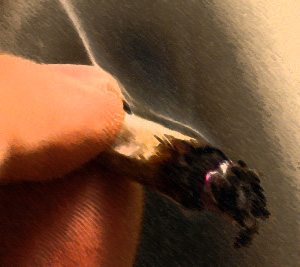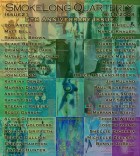What is it like to own and operate a bookstore?
It is a calling and a curse. All the dire predictions you’ve heard about small independent bookstores and their suffering are true. Yet it is all I know to do. I wish I could guide the jumbo jets in or turn someone else’s investment into profit for myself but all I can do is fumble in a greasy till and recommend David Markson novels to unsuspecting housewives.
On your website, you have included a self-portrait with a third eye. What does this eye see?
It sees the things that are necessary for me to write.
Why did you choose Flaubert for “The Angel’s Visitation”? Did you consider any other writers?
No big literary secret. Flaubert sounded better. Plus, well, OK, Flaubert is like a visitation from the angels all by himself.
Silence is significant to the story. How does silence relate to your writing in general? To your life?
If I could I’d make my entire output silent. Beckett said, “Every word is like an unnecessary stain on silence and nothingness.” I pull every word out of myself and some are breech births. Writing is hard so silence is easier. Silence is like surcease of sorrow. Silence is the snow cover before we walk all over it.
“The Angel’s Visitation” is reminiscent of Richard Brautigan. What kind of influence has his work had on yours?
I came to Mr. Brautigan at a young and impressionable age. He stamped my ticket and away I went. Like the Beats he gave a lot of young writers permission to talk, to get it down on paper. I used to write in frank imitation of him (well, not just him, but him along with James Tate and Frank O’Hara and Mark Strand and Leonard Cohen and Raymond Carver, among others) and now, rather than imitation, I prefer to call it homage.


